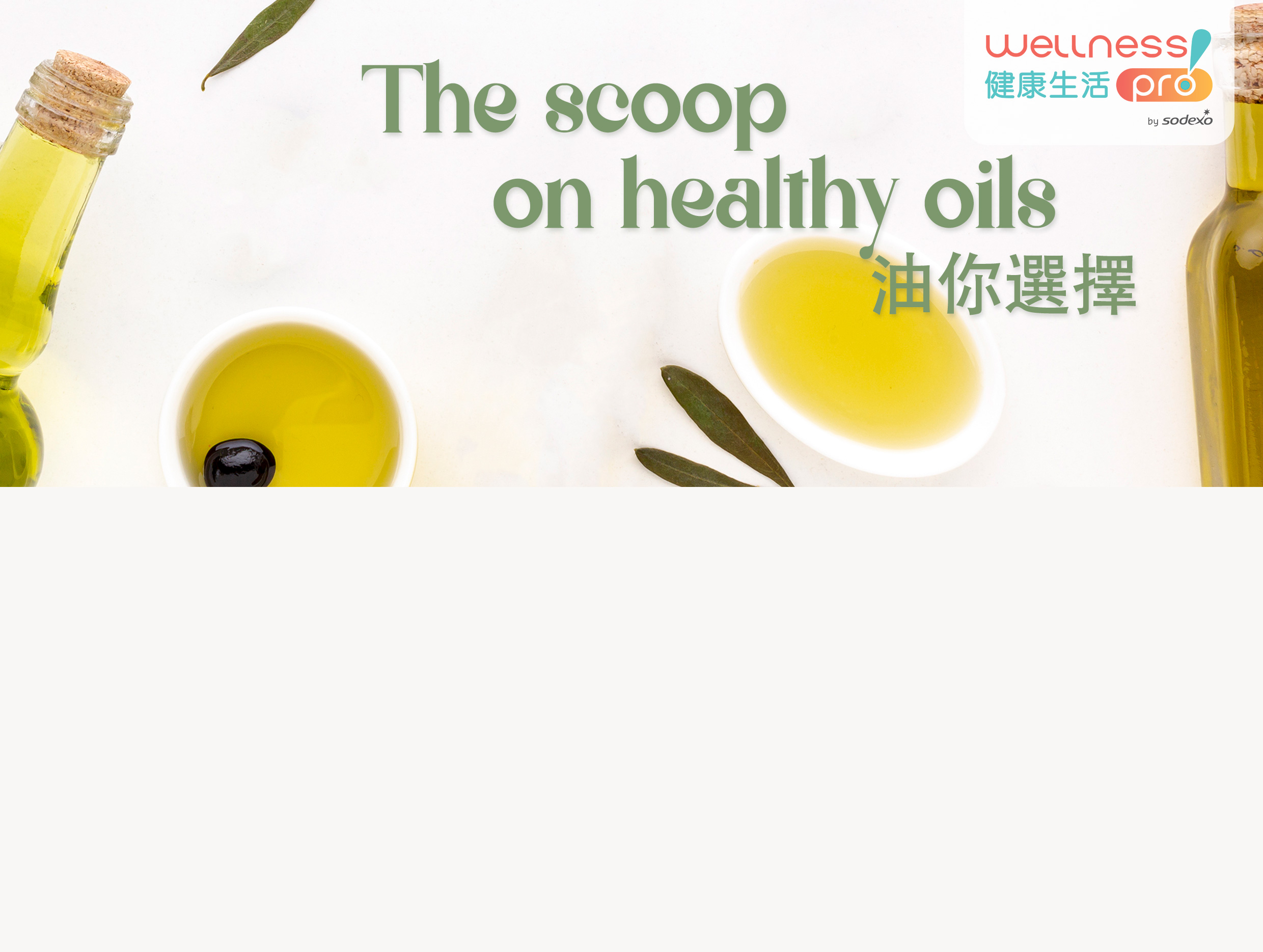There are plenty of options out there when it comes to healthy oils. With so many varieties available, choosing the right one can feel overwhelming. Let’s have a look at the different options and how to best use them for optimal flavour and health.
THE SCOOP OF HEALTHY OILS

Olive oil / Extra virgin olive oil
Compared with all edible plant oils, olive oil especially extra virgin olive oil contains the highest percentage of monounsaturated fatty acid, omega 9. This compound may help reduce bad cholesterol and increase good cholesterol in our bodies to protect the heart health.
However, extra virgin olive oil may have a low smoke point. It is best to use it to finish cooked dishes or in uncooked dishes, like salads or making sauces, while pure olive oil with higher smoke point is ideal for cooking.
Flaxseed oil
Omega 3 commonly found in fish oil, but flaxseed oil also offers high concentration of omega 3, alpha-linolenic acid (ALA). Omega 3 fatty acids are essential fats since your body cannot produce them and must obtain them from food. Also, omega 3 has also been shown to reduce the risk of heart disease. In this way, flaxseed oil provides vegetarians with a good source of omega 3.
Canola oil
Canola oil with mild taste is suggested to use for salads and dressings. This oil with omega 6 fatty acid help reducing bad cholesterol and boost the good cholesterol to promote your heart health. However, omega 6 in excess may promotes inflammation. In short, canola oil is preferred to use during cooking but be careful about the usage.
Sunflower oil
This oil is extracted from sunflower seeds and is price friendly. Sunflower oil is loaded with omega 6 fatty acid which help support heart health. Generally, fatty acid is an important element which helps body absorb fat soluble vitamins like vitamin A, D and E. This nutrient is also important to form the structure of cell membranes.
Coconut oil
Coconut oil has been growing in popularity recenly because of the purported health benefits. Some studies make claims about coconut oil with medium chain saturated fatty acids (MCFAs), which may help raising good cholesterol levels and lowering heart disease risk. However, most of the MCFAs in coconut oil are lauric acid and it may cause increased amount of bad cholesterol. Based on the current evidence, it is best consumed coconut oil in small amounts and more research needed to be done.
Rice Bran Oil
Rice bran oil contains higher proportions of heart healthy unsaturated fatty acid than saturated fat. It may help with the reduction of bad cholesterol and protect heart health. Thus, this oil rich in vitamin E, this fat-soluble vitamin may be beneficial for people with anaemia as it helps the formation of red blood cells. Additionally with a high smoke point, rice bran oil allows for frying and baking.
Avocado oil
This oil provides an avocado taste and nutty flavour. It is most used as salad dressing and for pan-seared dishes. As avocado oil contains 70% omega 9 fatty acids, it not only provides heart health benefits, but also contains vitamins A and E. Vitamin A and the lutein found in omega 9 are important for eye health and reduce the risk of age-related eye disease.
Sesame Oil
Sesame oils are mostly used in Asian cuisines. This oil comes from raw or toasted sesame seeds and may help to promote bone health as it is loaded with calcium. Sesame oil is a good source of unsaturated fatty acid and helps promote heart health. It is advised to limit the use to 1-2 teaspoons of sesame oil since 100ml of sesame oil could supply more than 800kcal to the body.
TIPS
How to choose cooking oils?
You can choose healthier cooking oils by checking the Nutrition Facts Label. Choosing oils containing more unsaturated fats instead of saturated fats may help promote your heart health.
SOURCES
- American Heart Association
- HK Department of Health
- UK National Health Service
- Harvard Health Publishing
- PubMed Central
